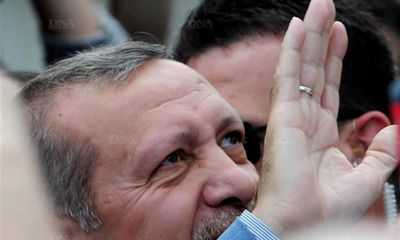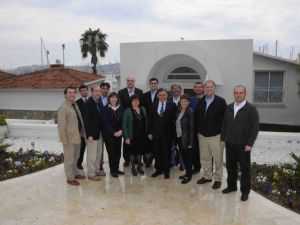 PARTNERS | BEIRUT (LEBANON) | 21 JUNE 2011
PARTNERS | BEIRUT (LEBANON) | 21 JUNE 2011
Editorial:
Turkish illusion prone to collapse
Neo-Ottomanism is the promotional cover chosen by the Justice and Development party to address the Arabs. By doing so it combined two ideas, the first being the symbolism of the cultural Islamic bind between the Turks and the Arabs and the second being the yearning for a Turkish role that dominates the Arab reality.
The first idea was primarily embodied by the Turkish people through their live interaction with the struggles of the Arab resistance in the face of Israel and the emergence of a political and cultural environment inside of Turkey against Zionism and its hostility during the last few years. This imposed itself on the Justice and Development Party which was surpassed by numerous Turkish sides and parties in terms of their heated positions and the size of their initiatives. Therefore, the Justice and Development party was described as being the one with the least drastic positions, taking into consideration the pulse of the street on one hand and the Turkish strategic commitments that are guaranteed by the army command towards the United States and Israel. Consequently, the policy of the party remained linked to the reference of the alliance with Washington and the membership in NATO, and continued to be limited to a political opposition of Israel’s obstruction of the settlement projects in the region.
As for the second idea, it recently surfaced through the eagerness of the Justice and Development party’s command to acquire an American assignment to manage important Arab files, based on its leading position in the international organization of the Muslim Brotherhood and the political adoption of the Turkish model as a basis for the renewal of the political structure of the Arab regimes.
This recipe is being tested in Egypt but it is clear that the Turkish wager on seeing it tested in Syria is obstructed by the fact that the Syrian Arab army is a national pan-Arab army in which there is no room for American and Western influence, as opposed to the situation in both Turkey and Egypt.
The Turkish wager is also being obstructed by the fact that the Egyptian MB’s commitment to the protection of Camp David will probably not be able to guarantee this agreement’s survival in the face of the mounting popular action of the youth that is invading the ranks of the MB itself and calling for the closing of the Israeli embassy and the toppling of the agreement of shame.
News analysis: Syria and the American September
The West led by the United States is proceeding with its campaign against Syria under the headline of condemning the use of violence in the oppression of peaceful demonstrations. Consequently, the Western governments are adopting measures aiming at blockading Syria under this pretext.
Firstly: The assumption that we are in the presence of peaceful demonstrations organized by political forces that are opposed to the rule in Syria – or are expressing a spontaneous rejection of social and political realties on the domestic arena – can no longer explain the course of events following the developments witnessed during the last few weeks, and after a number of Syrian oppositionists abroad who enjoy credibility within the Western circles recognized the existence of an armed activity undertaken by oppositionist factions that committed murder in a number of Syrian areas.
Secondly: For a national centralized state to deter any armed rebellion or terrorist violence – being called for by the Takfiris in Syria on sectarian and denominational bases – is one of the simplest sovereign rights of the states and authorities and is even an obligation in light of such circumstances.
Thirdly: It is clear based on the above that the West which is depleting all the pressure tools against Syria is facing a major strategic problem in moving towards a new stage that would open the door before direct interference. This problem is due to two factors, the first being Syria’s regional and international status and the Russian and Chinese positions that are refusing to collaborate with the West at the Security Council, and the second being the inability of the Syrian opposition groups to impose their control over any border regions in order to establish a bridge for foreign interference and repeat the Libyan model in Benghazi no Syrian soil, despite the deployment of massive financial, military, media and intelligence capabilities for that purpose.
The Western determination to subjugate Syria is ongoing and the testing of different forms and levels of interference is proceeding and will probably continue during the next few months, considering that September constitutes an American time ceiling to face more than one event in the region, all of which intersect with the Syrian issue.
The Arab file
Syria
• Return of stability to Jisr al-Shughour and the lifting of the largest Syrian flag in a pro-Assad demonstration
Units from the Syrian Arab army cleansed the city of Jisr al-Shughour and its surrounding from the armed terrorist organizations that terrorized the population, attacked public and private property and spread destruction and corruption throughout the city. In the meantime, twelve martyrs from the security forces were found in a mass grave after they were brutally killed by the elements of the terrorist organizations. Media outlets took pictures of this crime and the horrors that were committed by these elements who mutilated the corpses and severed the heads and limbs of the security elements. One of those who participated in the latter massacre also admitted that he, along with others, raped several women, killed them and threw their bodies in Al-Assi River.
• Thousands of young Syrian men and women – with the participation of hundreds of thousands of civil, youth and popular actors – raised the largest Syrian flag that was 2300 meters long and 18 meters wide to end the voluntary campaign launched by Syria’s youth under the headline “raise the biggest Syrian flag with us.”
• Syrian President Bashar al-Assad said during his meeting with Omani Foreign Minister Youssef Ben Alwi he was confident “in the ability of the Syrians to exit the crisis stronger and more unified than ever before.” For his part, Ben Alwi confirmed “the total support of all the ongoing reforms in Syria.”
Egypt
• Egypt arrests officer in Mossad
The Egyptian security apparatus arrested an officer in the Israeli Mossad who held dangerous and important secrets affecting the country’s national security in the second case of espionage to be exposed following the eruption of the January 25 revolution. According to the investigations, the security bodies were able to arrest the accused in a famous hotel in the capital. He had a laptop and three mobile phones that contained important and secret information about the country. The investigations added that the accused tried to recruit a number of Egyptians in order to acquire information affecting the country’s security, political, economic and social situation following the revolution. But also to follow a number of issues that have recently emerged in Egypt, namely the rise of the Islamists, the sectarian strife cases and the problems of the Copts.
• Insecurity in Egypt threatens elections
Asharq al-Awsat newspaper reported that the invasion by the Ittihad of Alexandria supporters of the field after their team lost a soccer game against Wadi Degla FC renewed fears over insecurity in the country. It added that the spectators invaded the field and attacked the players of their own team, thus forcing all the players to flee the stadium, assuring that clashes ensued between the police and the supporters and caused the injuring of twenty people, including 12 policemen. The paper then quoted an Egyptian journalist and a former police officer as saying in this regard: “These incidents reflect the state of insecurity prevailing over the country.” For his part, General Mohammad Kaderi Sa’id, a security expert at Al-Ahram Strategic Studies Center confirmed that the situation in the soccer stadiums reflected the entire security situation in Egypt, adding: “Our country has witnessed a revolution. But the outcome has not yet been seen on the ground and this is provoking the Egyptians’ frustration that is being evacuated in the stadiums.”
Libya
• The battles continued between the Libyan rebels and the brigades of Colonel Muammar Kaddafi in the Western parts of the Jamahiriya, and the rebels were able to gain control over a number of regions after Kaddafi’s Brigades withdrew from them. In the meantime, NATO’s aircrafts continued to bomb Tripoli’s suburbs, including the Mitiga international airport. US Secretary of State Hillary Clinton called on Africa to pressure Kaddafi to announce a ceasefire and step down.
• On the other hand, Kaddafi’s son, Sayf al-Islam, announced his father’s willingness to organize elections within three months under the supervision of international monitors.
• The Libyan television aired an audio message by Kaddafi in which he pledged to defeat the coalition that is led by NATO and is trying to remove him from power. Al-Kaddafi said: “They will be defeated. NATO will definitely be defeated. They will flee for their lives.” Kaddafi concluded: “Let them hit us with an atomic bomb. We are in our country. We did not invade or attack them.”
Yemen
• Collapse of truce in Yemen
The Yemeni opposition met with Vice President Abed Rabbo Mansour Hadi and a number of senior state officials and agreed over the appeasement of the situation and the continuation of the talks.
But a few hours later, the truce collapsed and the armed confrontations were renewed between the forces that are loyal to Ali Abdullah Saleh and the armed men supporting the youth revolution, thus resulting in the fall of several dead and wounded.
• In the meantime, conflicting reports emerged in regard to Saleh’s upcoming step. Indeed, while a Saudi official assured that Saleh will not be returning to Yemen, sources close to the president confirmed his imminent return to the country.
Palestine
• Israeli threat to cancel all the agreements signed with the Palestinians
Palestinian Foreign Minister Riad al-Maliki called on the European Union in Madrid to “collectively” recognize the independence of Palestine on the 1967 border.
Israeli Foreign Minister Avigdor Lieberman excluded for his part the resumption of the negotiations between the Palestinians and the Israelis to resolve the Palestinian issue, threatening to cancel all the agreements that were signed between the two sides if the Palestinian command were to request Palestine’s accession to the United Nations.
Israeli Prime Minister Benjamin Netanyahu reiterated his refusal to freeze the Jewish settlement activities in the occupied West Bank or to accept the establishment of a Palestinian state on the 1967 border with an exchange of lands, as it was proposed by American President Barack Obama.
• Al-Hayat daily carried report headlined “Gaza population preoccupied with Dahlan case” by its correspondent in Gaza Fathi Sabbah.
The paper said that Muhammad Dahlan’s case was the object of controversy on the Gaza street, between the man’s supporters who believe he defended Gaza and his detractors who are talking about his involvement in corruption and murder and his defeat by Hamas. It quoted two among his supporters in Gaza as saying they were afraid to voice their support of Dahlan in public, considering that Fatah’s Central Command could retaliate against them discontinuing the salaries they receive from the Palestinian Authority, as it would consider such a sympathy to be a defiance of its decision to exclude him from the movement and prosecute him on charges of corruption and murder.
For their part, members in Fatah expressed their dissatisfaction toward the decision to oust Dahlan from the movement, saying it was a decision against the Gaza Strip itself. They assured that this step was an attempt to disregard Dahlan’s importance and supporters, at a time when figures close to the man pointed out he had recently met with a very respectable Gaza figure in Cairo and contacted a number of Gaza officials in order to inquire about the best way to deal with the current predicament.
International affairs
The Israeli file
• Between Israel’s denial and Egypt’s confirmation of the obvious existence of an Israeli spy detained by the Egyptian security forces with a laptop and three cell phones containing highly dangerous information, it is certain according to the Jerusalem Post that this spy participated along with the Israeli army in its operation against Lebanon in 2006 during the battles of the town of Al-Taybeh in which he was injured. In 2008 he was a trainee in the so-called Israeli Project, which is an organization that aims at gathering support for Israel abroad.
• Moreover, the Israeli papers issued this week tackled several important topics related to the secret military preparations to face the demonstrations and protests expected to be held in September, during the voting at the United Nations over the recognition of the Palestinian state. The training is focusing on the confrontation of several possible scenarios, while army units – especially the Israeli Navy – are conducting training and maneuvers to deter the Turkish fleet coming to Gaza.
• On the other hand, Maariv assured that Israeli intelligence elements were cautioning that Hezbollah’s missiles were even directed toward the city of Eilat.
Lebanese Affairs
Editorial: The Syrian dimension in the Tripoli strife
The formation of Prime Minister Najib Mikati’s government constituted a strong blow to the wagers of the March 14 forces over the continuation of the governmental vacuum that was used to exploit the state apparatuses and capabilities and to exercise a dangerous security and political interference in Syria from Lebanon.
The new government relied in its formation on the parliamentary majority that includes the March 8 forces and centrist sides representing a wide Lebanese crowd from all the sects, while instead of accepting the logic of the transition of power and succumbing to the simplest rules of democratic parliamentary systems, the Future Movement and its allies launched a wide slander and instigation campaign which they led towards the security explosion in Tripoli under a clear headline featuring the intention to turn Tripoli and the North in general into a base for carrying out acts of sabotage in Syria. This would be done through the fueling of sectarian strife which the planners of this campaign wish to transfer to the neighboring Syrian areas after the armed terrorist groups failed to achieve this goal. The involvement by the Future movement and its allies in the Syrian crisis and especially its security incidents, has exceeded the level of media instigation and political statements, as Farid al-Ghadiri clearly revealed the implication of a Lebanese security apparatus in the incidents. He was pointing to services offered –as many believe- by the Information Branch through the facilitation of the entry of arms and armed men and the protection of the operations room funded by Al-Hariri inside of Lebanon to lead the armed rebellion inside of Syria. These Hariri and Bandari fingerprints were clear in Daraa, Baniyas, Homs and Tal-Kalakh in particular.
The new government confronted the strife project in Tripoli with extreme stringency since the first moment, thus deploying the army in the city and assigning it to deter any attempt to generate turmoil.
The Lebanese file
• The birth of the Lebanese government and the repercussions it entailed. At a quarter to three on Monday June 13th 2011, the government of Prime Minister Najib Mikati was born under the headline: “All for the country, all for action.” This occurred following a meeting held in the Baabda palace between President Michel Suleiman, Prime Minister Najib Mikati and Parliament Speaker Nabih Berri who proposed the increase of the Sunni representation to seven ministers by relinquishing a Shiite minister from his share and the Youth and Sports portfolio that was given to Faysal Karame.
• Following the announcement of the formation of his government Mikati delivered a speech in which he thanked Speaker Berri by saying: “This government would not have seen the light had it not been for the sacrifices and efforts of Speaker Berri.”
• On the sidelines of the government’s birth, Minister of State Talal Erslan resigned from the government in protest against the fact that he was not given a ministerial portfolio.
• Speaker Beri assured that the government was purely made in Lebanon, indicating that President al-Assad did not know what was taking place and that consequently the timing of the formation was not a Syrian one since Damascus had been pushing toward the formation of the government for months in order to have a reference in Lebanon with which it could cooperate to protect the border and prevent the smuggling of arms and anarchy into Syria.
• The first government session was headed by President Michel Suleiman who said during the inauguration: “The government is purely Lebanese and without any foreign interference. During the first 20 years of the Taif Accord, we became accustomed to Syrian reference. But Syria did not interfere now. This is what is required since we proved we are able to resolve our problems by ourselves.”
• March 14 reactions to birth of government
The Future bloc believed that the government which was announced by Mikati was the government of March 8 and Hezbollah which decided through its one color and political tendency to head in a direction that is opposed to the general course in the Arab world and against the commitments of the prime minister-designate at the level of the national principles.
Head of the Lebanese Forces Executive Committee Samir Geagea said that the government was completely loyal to the Syrian regime “Which brings back to mind the tutelage stage in its worst possible form.” He added: “Its formation placed Lebanon outside the Arab and international group, i.e. in a position of isolation and defeat.”
• Security tensions and clashes in Tripoli
The city of Tripoli witnessed clashes between the Jabal Mohsen and Bab al-Tebbene areas, leading to the fall of a number of dead and wounded, including a martyr from the army. Prime Minister Mikati gave clear instructions to Minister of Defense Fayez Ghosn and Army Commander General Jean Qahwaji saying: “Security is a red line. We will not accept the return of the scenes of war and the times of the thugs and militias, neither in Tripoli nor in any other Lebanese town or village.”






